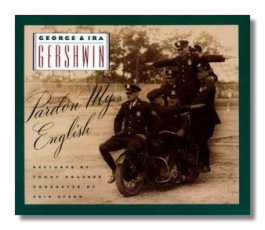
The Internet's Premier Classical Music Source
Related Links
- Gershwin Reviews
- Latest Reviews
- More Reviews
-
By Composer
-
Collections
DVD & Blu-ray
Books
Concert Reviews
Articles/Interviews
Software
Audio
Search Amazon
Recommended Links
Site News
 CD Review
CD Review
George Gershwin

Pardon My English
1993 Studio Cast
William Katt
Arnetia Walker
Michelle Nicastro
John Collum
Orchestra of St. Luke's/Eric Stern
Elektra Nonesuch 79338-2
A young Englishman, Michael Bramleigh, falls in love with Ilse Bauer, the daughter of the Dresden police commissioner. Whenever the blameless young man receives a blow to the head, he becomes Golo, master criminal and lover of Gita, girl entertainer and moll. Another blow to the head restores him.
Pardon My English was a late Gershwin score, sandwiched between Of Thee I Sing and Let Em Eat Cake. Despite wonderful music, it flopped after weeks of out-of-town tryouts, fix-it sessions, and 46 performances. Its main problem lay in the book and to some extent in its timing. It was a bit late in 1934, after all, for a musical about comical Germans. There is also a nasty extended plot point about Golo seducing Ilse (who naturally believes him to be Michael). Almost all the wit lies in George's music and Ira's lyrics. Gershwin poured some of his most sophisticated music into the score and came up with some great songs besides: "Isn't It a Pity," "The Lorelei," and the rousing "My Cousin in Milwaukee." He wrote the last two for the charmingly sexy Lyda Roberti (it comes through even in still photographs), one of the few high spots in the show. In fact, Roberti poured out so many volts that she completely eclipsed the show's nominal heroine. Further, the criminal side of the hero's personality had most of the good songs. Vice was once again far more interesting than virtue. Against all the intentions of the book, you wanted Roberti to get her crooked lover. The show sank. Only the three songs mentioned above were published.
Once again, Tommy Krasker has magically restored a "lost" show, aided by the contents of the Secaucus Trunk, which contained the original performing versions of several musicals. William Daly, Robert Russell Bennett, and Adolph Deutsch wrote the original orchestrations. Those charts still missing (and a bit of touch-up work) were supplied by the fabulous Russell Warner – a superb arranger with a very deep knowledge of and regard for 20s and 30s theater practice.
After his experience with writing scenes (as opposed to songs) in Of Thee I Sing, Gershwin returned to writing "numbers," but with increased skill. Pre-Sondheim, he loads his score with essentially dance forms: Viennese waltzes, English waltzes, polkas, and so on. Still, this is not a show of generic songs. Almost all (including the tender "Isn't It a Pity") connect in some way to the milieu or the plot. The score also leans heavily on counterpoint, an increasing concern in Gershwin's Broadway music. You can readily hear this, but for details, I refer you to Steven E. Gilbert's The Music of Gershwin (New Haven & London: Yale Univ. Press, 1995; ISBN 0-300-06233-8). Furthermore, Gershwin seems to have expended great care on every number, including the ones for the chorus. You won't find a throwaway or toss-off like Girl Crazy's "Barbary Coast." Curiously, one such number – "Dancing in the Streets" – echoes the second Shrovetide Fair sequence from Stravinsky's Pétrouchka.
The score itself will grab you. In addition to the three big songs, highpoints include "The Dresden Northwest Mounted," a parody of Romberg's Riffs and mounties and Friml's noble rabble of Paris. It also descends from the policemen in Pirates of Penzance (has anyone ever done a paper on Gilbert and Sullivan's Broadway influence in the 20s and 30s? It's a natural) – "We're the Dresden Northwest Mounted / And we always get our man – / (If we can)." "Freud and Jung and Adler" soft-shoes through psychoanalysis with Ira's (and George's) classy wit. "Luckiest Man in the World," a bluesy duet between Golo and his moll, deserves to be better known. Hell, the whole score deserves that.
The performances are a mixed bag. John Cullum shines as Commissioner Bauer (a role originated by the radio comedian Jack Pearl, a.k.a. "Baron Munchausen"). Given his considerable stage experience, I would find it strange if he didn't. Michelle Nicastro does well with an insipid role as Ilse. William Katt is okay as Michael/Golo, but my lukewarm reaction has much to do with the fact that his voice reminds me of Michael Feinstein's – too much nose and throaty throb. The same goes for Arnetia Walker's Gita, who simply works too hard. The players are at odds with the score: the show needs a very light touch. The broad comic character is Bauer, not the lovers' triangle.
The frothy effervescence vital to the show is provided mainly by conductor Eric Stern, who clearly has absorbed the spirit of the score to his fingertips and toes. Even better, he respects Gershwin's craft. The performance dances, sparkles, and soars because he has gotten the orchestra to take the trouble of playing cleanly and of listening to one another, like the members of a chamber ensemble. Despite cast problems, this is still one lovely, enjoyable disc.
Copyright © 1996, Steve Schwartz


















